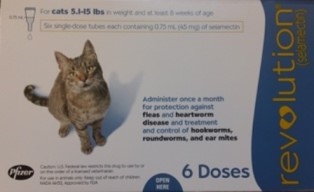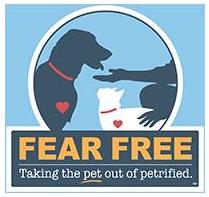
May 2014 – Flea and Heartworm Prevention for your Cat
Revolution (salamectin) is the veterinarian’s Number One Choice for feline flea and heartworm prevention. Using preventatives is just as important for indoor cats as it is for those outdoors. Here’s why:
Indoor cats can get fleas, roundworms, heartworms and develop asthma.

It’s easy for these dangers to invade your home. Invisible eggs get stuck to your shoes which get carried into your home. Fleas and mosquitoes sneak inside around door and window screens. These parasites can also hitch a ride on your dog or a stink bug as a vehicle straight into your house.
All it takes is one mosquito bite to infect your cat with heartworms. Heartworm can be deadly and is not easily detected in cats until symptoms present.
Fleas can transmit a disease known as feline infectious anemia, another dangerous disease that targets your pet’s red blood cells. Feline infectious anemia is also known as mycoplasma, previously called haemobartonella, and more well known by the general public as cat scratch fever. Year-round preventatives can be lifesaving.
Follow your veterinarian’s advice when it comes to preventatives.
Over-the-counter flea sprays, collars, shampoos, and spot-on preventatives contain permethrins which are toxic to cats if accidentally ingested by grooming.
Revolution is the only topical for cats that is FDA approved and safe if accidentally ingested.

Ask your veterinarian about Revolution at your next wellness visit. Learn more at Revolution4Cats.com
Recommended Reading: Flea Control for your Pets
May 2014 – It’s National Dog Bite Prevention Week!
May 18-24 is designated as National Dog Bite Prevention Week. The AVMA reports with an estimated population of 70 million dogs living in U.S. households, millions of people, most of them children, are bitten by dogs every year. The majority of these bites, if not all, are preventable.
Why dogs bite: Dogs can bite because they are nervous, scared, in pain, surprised, or just protecting their house, car, toy, bed, etc. Dogs see your actions and can smell your anxiety or fear which can stimulate them to a heightened level of arousal.
Dogs respond to body language. If a dog is misreading your actions, they will try to protect themselves. Loud noises and fast movements can excite or scare dogs.

When a dog is in pain either from illness or injury, they don’t understand where the pain is coming from. If you touch them, that sensation might create more pain for them, and they could respond by biting. Many dogs are quiet even when in pain. If you suspect your dog is in pain, simply leave it alone and rely on your veterinarian’s advice on how to best handle the dog.
Pet parents need to be proactive rather than reactive to their dog’s behavior. Practicing and rewarding calm behaviors and jobs like “sit and stay” can lead to really good manners and habits. Using treats and practicing positive reinforcement as often as you can on a daily basis are key.
Visit the AVMA’s website to learn more about dog bite prevention and access tools to help educate others so we can all work together to prevent dog bites.
Recommended Reading: Dr. Joe Martins addresses local Cub Scouts on Pet Safety
The Belle Mead Animal Hospital, Your Other Family Doctors









